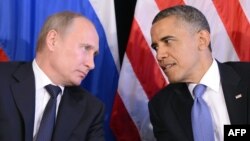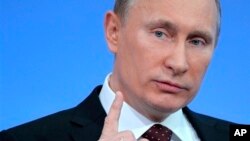From the first day he entered the White House, President Barack Obama has tried to make better relations with Russia a cornerstone of his foreign policy. That worked for a while, but relations with Moscow have been on a downward spiral lately and sharp disagreements over Syria could make matters even worse.
Foreign policy in Obama’s first administration was dominated by what his advisers called the “reset” – a program designed to improve relations between the Washington and Moscow that had reached a low point during the last few years of George W. Bush’s administration.
The “reset” did bring some concrete results, however, such as a major strategic arms control treaty. Moscow also allowed U.S. forces to transit through Russia to get in and out of Afghanistan. And Russia even voted along with Washington at the United Nations to impose tougher sanctions on Iran over its suspected nuclear weapons program. In addition, Washington played a key role in getting Russia admitted to the World Trade Organization.
But now, according to foreign policy analysts, relations between the two countries are deteriorating – again.
Tense times nothing new
One of those analysts is Robert Legvold, professor emeritus at Columbia University. He says ups and downs in Washington-Moscow relations are nothing new.
“It happened in the Clinton administration after the enlargement of NATO,” Legvold said. “And through the Kosovo war in 1999, things were at a low point at the end of the Clinton administration – we weren’t getting anything done.
“We were pretty much where we are now,” Legvold said. “It happened again after the progress in the Bush administration following 9/11, in the years from 2003, the Iraq war to the Georgian war in 2008.”
Legvold says the first Obama administration managed to improve Washington-Moscow relations while Dmitry Medvedev was the Russian president.
“Now we are back there and we haven’t figured out a way to move beyond this cycle,” he said.
The latest reason for pessimism, the analysts say, is a major disagreement between the United States and Russia over Syria. Washington wants Syrian President Bashar al-Assad out of power while Moscow continues to support him both on the international political scene and with continued deliveries of modern weaponry.
But Matthew Rojansky, director of the Kennan Institute at the Wilson Center in Washington D.C., says Russia’s opposition goes beyond the issue of regime change and arms supplies.
“There is a secondary issue here, which is what does the day after Assad look like?” Rojansky says. “So let’s say, Assad goes. Let’s say the Alawite regime goes. What then?
“They [the Russians] look at Egypt. They look at Libya,” Rojansky continues. “They look at Iraq, Afghanistan – and they don’t see a single case in which they are comfortable that there’s a bulwark against Islamism, weapons trafficking, the endless spread of jihadi terrorists – many of which, I think, they rightly assume, would end up killing Russians, would end up in the North Caucasus, maybe even around the Sochi [2014 Winter Olympic] games.”
Putin crackdown also cited
Many experts say Russian President Vladimir Putin’s crackdown on civil society is also having a negative effect on U.S.-Russian relations. Other areas of disagreement include missile defense and Russia’s granting temporary asylum to former U.S. intelligence contractor Edward Snowden, wanted by the United States on espionage charges.
Partly as a result of that move, Obama cancelled a one-on-one meeting with Putin in Moscow in advance of the G-20 economic summit in St. Petersburg in early September.
Rojansky says Obama’s decision was a mistake.
“But to him [President Obama], it makes sense to say look, ‘I am going to the G-20 which is in Russia. I’ll have my handshake with Putin. But why should I go to Moscow and spend half a day with a guy who has not sent any signals that he is willing or interested to make progress on any of the issues that are important to me.’
“It makes good sense to Obama, even makes maybe objective political sense,” Rojansky said. “The only context in which it doesn’t make sense is the history of U.S.-Russian relations, where if you close doors and you close channels of communication, especially at the highest levels, you pretty much guarantee failure and ultimately crisis.”
Robert Legvold agrees, adding that in times of crisis open doors and good communications are especially important.
“The risk is that in this circumstance, when the national leaders are not invested in improving the relationship and building on the relationship, when things come along, were you to have another event that in any way resembled the Russian-Georgian war, presumably an event that would be within the post-Soviet space, it has the risk of very serious deterioration.”
(To see more of Andre de Nesnera's columns, click on the link below)
Foreign policy in Obama’s first administration was dominated by what his advisers called the “reset” – a program designed to improve relations between the Washington and Moscow that had reached a low point during the last few years of George W. Bush’s administration.
The “reset” did bring some concrete results, however, such as a major strategic arms control treaty. Moscow also allowed U.S. forces to transit through Russia to get in and out of Afghanistan. And Russia even voted along with Washington at the United Nations to impose tougher sanctions on Iran over its suspected nuclear weapons program. In addition, Washington played a key role in getting Russia admitted to the World Trade Organization.
But now, according to foreign policy analysts, relations between the two countries are deteriorating – again.
Tense times nothing new
One of those analysts is Robert Legvold, professor emeritus at Columbia University. He says ups and downs in Washington-Moscow relations are nothing new.
“It happened in the Clinton administration after the enlargement of NATO,” Legvold said. “And through the Kosovo war in 1999, things were at a low point at the end of the Clinton administration – we weren’t getting anything done.
“We were pretty much where we are now,” Legvold said. “It happened again after the progress in the Bush administration following 9/11, in the years from 2003, the Iraq war to the Georgian war in 2008.”
Legvold says the first Obama administration managed to improve Washington-Moscow relations while Dmitry Medvedev was the Russian president.
“Now we are back there and we haven’t figured out a way to move beyond this cycle,” he said.
The latest reason for pessimism, the analysts say, is a major disagreement between the United States and Russia over Syria. Washington wants Syrian President Bashar al-Assad out of power while Moscow continues to support him both on the international political scene and with continued deliveries of modern weaponry.
But Matthew Rojansky, director of the Kennan Institute at the Wilson Center in Washington D.C., says Russia’s opposition goes beyond the issue of regime change and arms supplies.
“There is a secondary issue here, which is what does the day after Assad look like?” Rojansky says. “So let’s say, Assad goes. Let’s say the Alawite regime goes. What then?
“They [the Russians] look at Egypt. They look at Libya,” Rojansky continues. “They look at Iraq, Afghanistan – and they don’t see a single case in which they are comfortable that there’s a bulwark against Islamism, weapons trafficking, the endless spread of jihadi terrorists – many of which, I think, they rightly assume, would end up killing Russians, would end up in the North Caucasus, maybe even around the Sochi [2014 Winter Olympic] games.”
Putin crackdown also cited
Many experts say Russian President Vladimir Putin’s crackdown on civil society is also having a negative effect on U.S.-Russian relations. Other areas of disagreement include missile defense and Russia’s granting temporary asylum to former U.S. intelligence contractor Edward Snowden, wanted by the United States on espionage charges.
Partly as a result of that move, Obama cancelled a one-on-one meeting with Putin in Moscow in advance of the G-20 economic summit in St. Petersburg in early September.
Rojansky says Obama’s decision was a mistake.
“But to him [President Obama], it makes sense to say look, ‘I am going to the G-20 which is in Russia. I’ll have my handshake with Putin. But why should I go to Moscow and spend half a day with a guy who has not sent any signals that he is willing or interested to make progress on any of the issues that are important to me.’
“It makes good sense to Obama, even makes maybe objective political sense,” Rojansky said. “The only context in which it doesn’t make sense is the history of U.S.-Russian relations, where if you close doors and you close channels of communication, especially at the highest levels, you pretty much guarantee failure and ultimately crisis.”
Robert Legvold agrees, adding that in times of crisis open doors and good communications are especially important.
“The risk is that in this circumstance, when the national leaders are not invested in improving the relationship and building on the relationship, when things come along, were you to have another event that in any way resembled the Russian-Georgian war, presumably an event that would be within the post-Soviet space, it has the risk of very serious deterioration.”
(To see more of Andre de Nesnera's columns, click on the link below)






